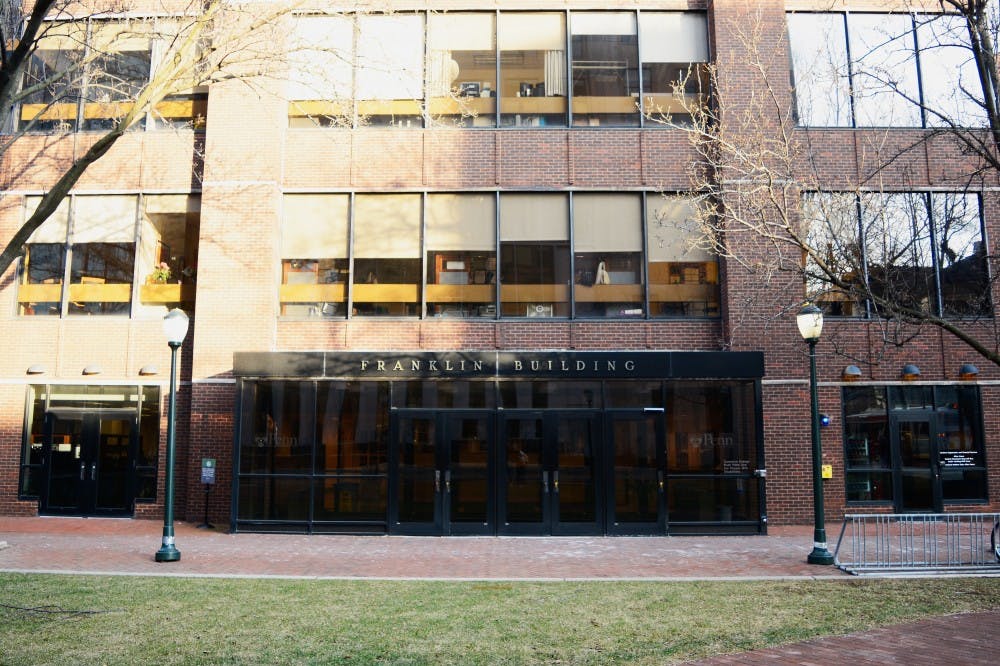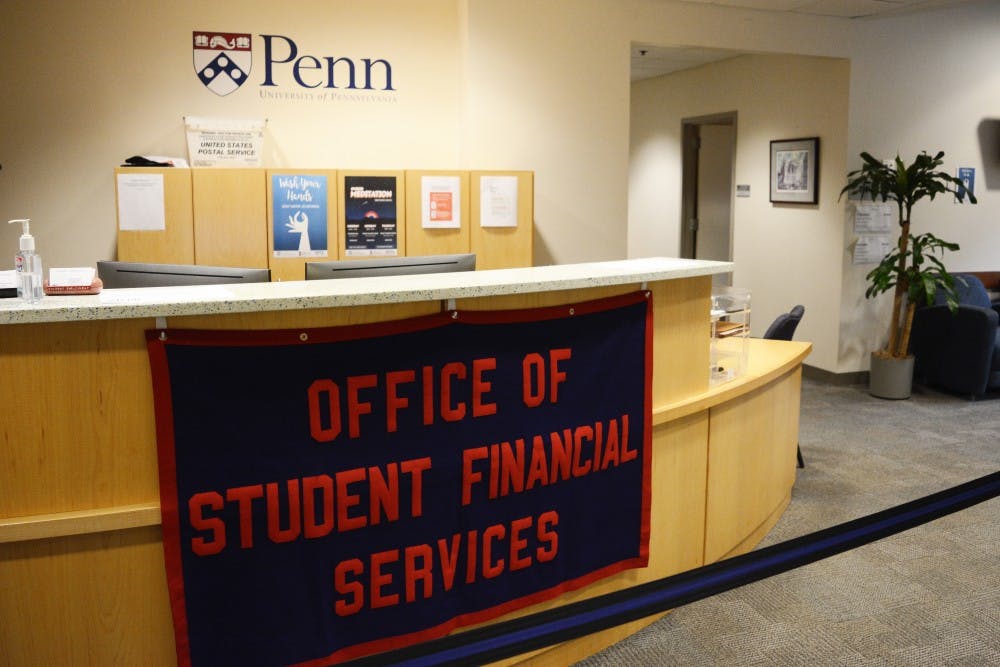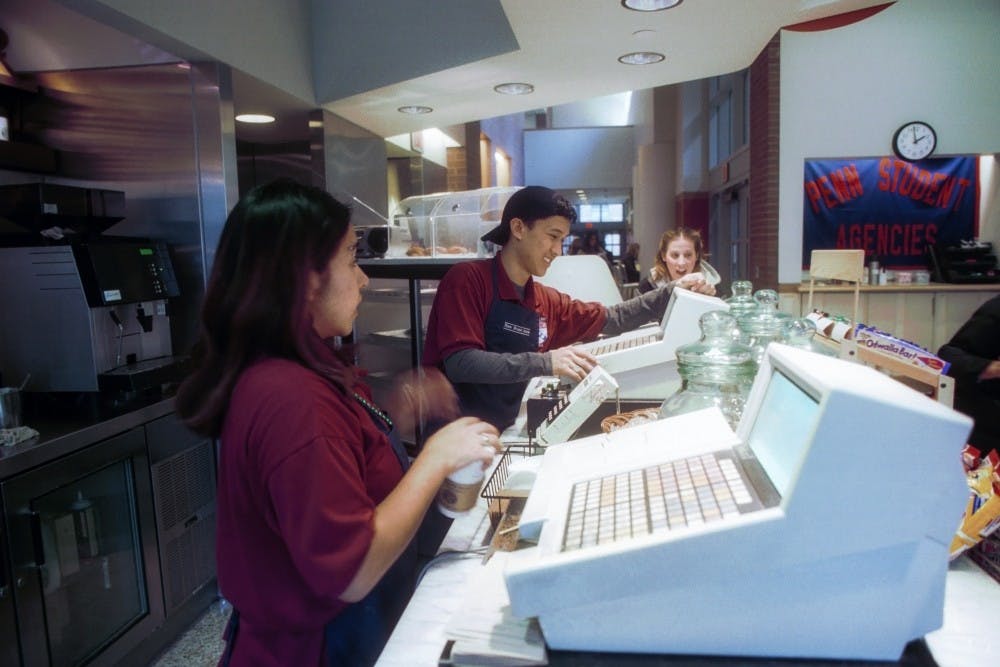
The Franklin building, located on 36th and Walnut Streets, contains the Student Registration and Financial Services office.
Credit: Mona LeeMore than a year since Student Registration and Financial Services said they would build a new database to consolidate all work-study jobs and increase work-study positions, SRFS has changed course after an internal investigation revealed that a large number of the positions were unfilled.
In response to student concerns in January 2018, SRFS announced that it would improve accessibility to work-study positions by January 2019 and work to raise and standardize salaries.
But SRFS is now no longer working to consolidate all work-study positions into a single listing and increase the job pool, Senior University Director of Financial Aid Elaine Papas-Varas said. SRFS also does not have plans to raise work-study wages, and is waiting for the government to set a new nationwide minimum wage.
Although SRFS is forgoing these plans, students continue to remain frustrated with the low wages and the difficulty of finding work-study positions.
In January 2018, students pointed out that they found work-study positions on the Center for Undergraduate Research and Fellowships website that were not listed on the SRFS website. The SRFS internal investigation found that these CURF positions were not work-study positions, but rather indicated that the professors were open to work-study positions, Director of Communications for the Division of Finance Paul Richards said.
The SRFS investigation also found that many jobs on the SRFS work-study job search website were not being taken. In the 2017-2018 academic year, 4,060 students were eligible for Federal Work-Study funding as a part of their financial aid package. Only 60 percent of these students were employed in work-study positions during the academic year, Richards said.
“I do not know why that is, and that is bewildering because we have students who are absolutely awarded and there are absolutely jobs out there to be had and students have chosen not to take work-study,” Papas-Varas said.
But students say they are not surprised that students deliberately do not hold work-study jobs, citing the disorganization of the work-study directory and the lack of assistance from SRFS.

After an internal investigation, SRFS found that many work-study positions remain unclaimed.
College junior Carter Gale, who tutors through the Netter Center for Community Partnerships as part of his work study, said he is not surprised that many students eligible for work study “give up” on finding a job.
“The positions are obviously there, but [the directory] is just so big and unorganized that it’s hard when applying,” Gale said. “It’s hard knowing which jobs are going to be competitive. It’s hard knowing which ones there’s a lot of people applying to.”
Engineering senior Liliane Kevine Ikirezi, who works in the Penn Law Alumni Relations office for her work-study job, added that the directory is not always up to date, complicating the search for positions.
"I would message for jobs, and then they would be like this position has been filled, but the position has been displayed for three weeks or so," Ikirezi said. "It was just really confusing which jobs were still available, and which jobs were not."
Ikirezi added that she directly emailed the contact person for her work-study position because she wasn't sure whether it was available from the SRFS website.
Richards said that once an employer officially appoints a student to a position, the job listing should automatically be removed from the directory. Richards said, however, that employers do not always update the status of their jobs.
"We are discussing adding some additional reminders for employers to encourage them to fill or remove jobs they no longer intend to fill," Richards wrote in an email to The Daily Pennsylvanian.

Working at the cafe in Williams Hall is one of the many work-study positions available to Penn students. (File Photo)
Gale added that students eligible for work study also receive little help from SRFS staff to aid them in finding jobs.
“There’s not any help from up top spacing people out and making sure that every work-study student has a job,” Gale said. “That work is very much front-loaded on the student.”
While SRFS has no plans to increase the number of work-study jobs or consolidate their work-study database, they also do not have definite plans to increase the hourly rate for work-study jobs. Papas-Varas said that SRFS hopes to change the standardized wage by the next academic year, after the new hourly minimum wage is announced and SRFS knows the amount that the federal government will allot to Penn.
Although students say they are grateful for the additional income from their work-study jobs, the wages tend to be poor for the amount of work they put in.
“I personally found it really tiring and really a low wage," Ikirezi said. She added that she believed her hourly rate should have been increased while she was working at Van Pelt Library's underground lifting heavy packages. Her hourly rate was $7.50 per hour.
The Daily Pennsylvanian is an independent, student-run newspaper. Please consider making a donation to support the coverage that shapes the University. Your generosity ensures a future of strong journalism at Penn.
Donate






